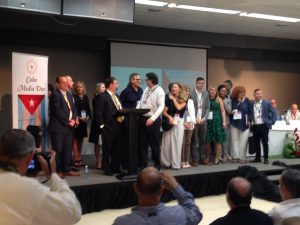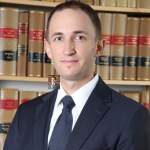
CUBA STANDARD — After two bad months for Cuba travel — following the Trump administration’s new confrontational rhetoric, allegations of U.S. officials being under physical attack in Havana, a State Department travel warning, and new restrictions on travel — U.S. industry executives went on the counter-offensive.
“Traveling to Cuba is legal and safe, something that many Americans do not fully understand,” Tom Popper told a dozen reporters, a panel of experts, and more than 30 U.S. travel executives during an event Monday in Havana.
The founder of New York state-based Insight Cuba, among the largest U.S. Cuba tour operators, put together a “Cuba Media Day”. With the one-day event Jan. 29 at the Meliá Cohiba hotel in Havana Popper was trying to signal to Americans that travel to Cuba is not just OK but great.
The event comes amid a decline in U.S. travel to the island that set in towards the end of a boom year.
A total of 1.173 million U.S. visitors checked into Cuba in 2017, 91% more than in 2016, Cuba’s chief diplomat for U.S. affairs announced in repeated tweets from her official account in January. That included close to 454,000 Cuban Americans — 37.8% more than in the previous year —and nearly 620,000 non-Cuban U.S. travelers — a whopping 117.4% increase from 2016.

However, in a sign that the Trump administration’s rhetoric seems to be scaring away travelers, top executives of three U.S. travel companies and the manager of one hotel in Havana confirmed to Cuba Standard that their U.S.-Cuba business took a dive this fall and winter. Popper said reservations at Insight Cuba are down 50% this month. Occupancy at the 27 hotels in the island managed by Meliá Hotels declined 20% in December and January compared to last year, Francisco Camps, the Spanish company’s head of Cuba operations, said at the event.

While Cuba’s overall visitor figures rose 16.5% percent in 2017, the last two months showed a marked slowdown, mostly due to U.S. travel. Visitor numbers were down 10% in December and have been lagging 7-8% in January, said José Manuel Bisbé York, president of Grupo Empresarial Viajes Cuba, the state holding in charge of the vast majority of inbound travel. Arrivals from the United States, which skyrocketed in December 2016 with the initiation of scheduled flights, were down 30% this December, he told a Reuters reporter.
In addition to the U.S. scare, images of the destruction by Hurricane Irma at beach resorts on Cuba’s northern keys probably prompted travelers to stay away, Bisbé said, adding that the number of Canadian visitors was down 4-5% in 2017. Cuba’s tourism players were able to not only fix the damage but make complete renovations to some resorts, reopening in time for high season in November, just 90 days after the storm hit.
State Department drops another bomb
It became clear during the event that turning around perceptions is an uphill struggle.
In what was the equivalent ot throwing a grenade into the conference room at the Meliá Cohiba, the same day a State Department spokeswoman told a Miami Herald reporter that 19 U.S. travelers recently reported a variety of health symptoms similar to those the Trump administration says are afflicting 24 U.S. officials after what it says are “attacks” in Havana. According to the Herald, the spokeswoman said the State Department received the health complaints from the 19 private travelers since it had issued a travel warning for Cuba in September.
The U.S. government has yet to provide any witnesses, substantial evidence, or the results of an FBI investigation to the public. The alleged health symptoms cover a wide range, from dizziness and headaches to hearing loss. Even so, the Trump administration insists they are the result of “attacks”. The Cuban government says its own investigation has not found any evidence for that; since their investigators had no access to any of the alleged victims, they are unable to come to a conclusion about what could have caused any such symptoms. However, Cuban experts say the symptoms are unlikely to be caused by a sonic device.
Using a term to describe what she thought of the allegations she said was unfit for public consumption, Peggy Goldman is sure none of the thousands of Cuba travelers her Pennsylvania-based Friendly Planet Travel has handled since 2011 has been suffering of similar symptoms.
“All Cuba travel is covered by health insurance, and we get to hear of any problems,” she told Cuba Standard. “Typically, travelers ask us for help if they file a claim with the insurance.”
“None,” she said, asked if any client had filed a claim based on “sonic” symptoms.
More hole than cheese
The main challenge the travel industry is facing seems to be the American public’s fears and perceptions, rather than the Trump administration’s actual restrictions.

Leaving the impression that Washington’s new regulations for Cuba travel may be more hole than Swiss cheese, a U.S. lawyer told the crowd at Cuba Media Day that there are simple ways for U.S. tour operators to legally put up their clients in any of the 83 Cuban hotels that were recently placed on a “Cuba Restricted List” by the Trump administration.
Since the activity incriminated by U.S. enforcers is payment — rather than the actual use of the blacklisted hotels — Cuba could simply switch booking and payment for the hotel services to an entity that was not included.
“U.S. travelers can stay even at hotels on the list,” said Lindsey Frank, a principal with New York law firm Rabinowitz, Boudin, Standard, Krinsky & Lieberman, P.C., about new restrictions published by the Office of Foreign Assets Control in November. “OFAC confirmed to us recently that, even though direct payment to restricted entities is prohibited, they can still stay in hotels that are on the Restricted List — as long as they make their arrangements and payment through an unrestricted agency that is not subject to U.S. jurisdiction, such as Havanatur. This is a real opening for staying at any hotel here.”
The lawyer told Cuba Standard he received this guidance verbally from an OFAC official, in response to a written inquiry.
Asked how close Cuba is to offering alternative travel arrangment and payment mechanisms, the chief executive of the state holding that combines all major inbound tour operators — including Havanatur — held up his hand, forming a tight “V” with his thumb and index.
“This close,” said José Manuel Bisbé York, president of Grupo Empresarial Viajes Cuba.
The State Department’s “Cuba Restricted List”, published in November with the aim of blocking transactions with all armed-forces controlled businesses, includes practically all hotels in Old Havana, the single most popular tourism destination in the island. All boutique hotels there are operated by state company Habagüanex, which was recently taken over by GAESA, the armed forces-controlled holding.
Meanwhile, experts at the event also made clear that — despite the Trump administration’s stated intent of blocking it — individual travel is still possible, either under the auspices of an organization, or under “Support for the Cuban People”, one of 12 travel categories permitted by U.S. sanctions. If they decide to use that category, solo travelers have to stay at privately owned accommodations, pursue a full-time schedule of activities, and keep track of what they are doing, in case U.S. officials ask for evidence.
Travel executives at the event said that follow-up by U.S. sanctions enforcers after travel is very rare. With the exception of a musical group from California that was questioned by OFAC officials last year after their Cuba trip, none of the companies that together handle tens of thousands of travelers said they had heard of any OFAC investigations.
“We are not aware of any stepped-up enforcement,” Popper said.
